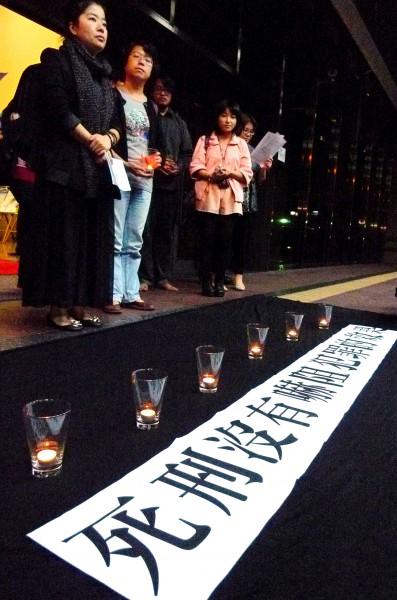《TAIPEI TIMES 焦點》 Activists criticize death penalty

A banner that reads “The death sentence is not a deterrent to crime” is laid out on a table in front of members of the Taiwan Alliance to End the Death Penalty at the Ministry of Justice in Taipei on Dec. 21, 2012. Photo: CNA
THE CASE AGAINST: UK Representative to Taiwan Chris Wood said executions undermine human dignity and there is no conclusive proof that they deter crimes
By Loa Iok-sin / Staff reporter
Campaigners against the death penalty from both Taiwan and the UK yesterday accused the government of failing to fulfill its obligations under the International Covenant on Civil and Political Rights (ICCPR) concerning executions by abolishing the death penalty.
“In 2009, the international community welcomed Taiwan’s decision to ratify the two international human rights covenants and to make them domestic laws. We believed that it would lead to the ultimate abolition of the death penalty,” UK Representative to Taiwan Chris Wood said during a press event to release the first report on the death penalty in Taiwan published by the UK-based nonprofit advocacy group the Death Penalty Project in Taipei. “Sadly, in the years since then, there have been multiple executions.”
While stressing that it is the government and the people of Taiwan that should make the final decision on capital punishment, Wood said that the British government had expressed its disappointment following executions carried out in April.
“The death penalty undermines human dignity and there is no conclusive evidence that it deters crimes,” Wood said, adding that two-thirds of countries have abolished capital punishment.
While saying that signing the ICCPR does not mean that a country should immediately abolish capital punishment, Death Penalty Project executive director Saul Lehfreund said that signatory nations — including Taiwan — have consented to make it the ultimate objective and to follow the most strict standards before executions.
“The covenant provides the right to request a pardon and clemency [for death-row inmates], no person may be executed while an application for clemency or a pardon is in process,” Lehfreund said. “Unless Taiwan can fulfill its human rights obligations, it should not carry out executions.”
While many people against the abolition of the death penalty argue that it is part of the culture and that Taiwan should not abolish capital punishment due to pressure from foreign and domestic human rights groups, Lehfreund said that “retaining the death penalty does not involve sovereignty, culture or tradition.”
Elaborating on Lehfreund’s views, Chang Wen-chen (張文貞), an associate professor at National Taiwan University’s Law School, and a coauthor of the report, said that the government has clearly not met the minimum requirements when carrying out executions.
“According to the law, the president is the only person who has the power to grant an amnesty, but other government agencies — including the Council of Grand Justices, the Control Yuan and the Legislative Yuan — also have the power and the obligation to better protect the rights of death-row inmates,” Chang said. “For instance, currently the president is not required to reply to a death-row inmate’s application for pardon. So we’ve cases in which inmates don’t know what’s going on after filing an application for pardon or an appeal, and were informed that they would be executed the next day, without knowing whether the application process had ended.”
In such cases, the legislature may intervene by amending the law to require that the Presidential Office or the judiciary should clearly inform inmates about the handling of their applications for a pardon or an appeal, Chang said.
Democratic Progressive Party Legislator Yu Mei-nu (尤美女) also said that while the ICCPR states that a person suffering from a mental disorder should not be executed, “we have no law requiring mandatory assessment of an inmate’s mental condition — this is something we should do immediately.”
新聞來源:TAIPEI TIMES
















